What it is like to work inside encode.org as a Purpose Agent in a For-Purpose enterprise
By Dennis Wittrock orginally published on medium.com in encode.org
I joined encode.org in July 2016. Long before that I always felt attracted to working in a holacratic environment. Now there was this opportunity opening up to work with some of the pioneers of Holacracy and to work on taking the next step, currently captured in the encode.org purpose statement “Going Beyond Employment. Liberating Purposeful Work.” Did I want to be part of this endeavour? Sure thing.
Tom Thomison in his Member/Partnership role set up a series of conversations to walk me through the implications of joining encode.org and to explain the legal and financial constructs underpinning this For-Purpose enterprise.
By signing I became a full legal manager of the company, as well as a partner of the organization — equally responsible to manage the company and equally legally liable.
This felt empowering because I entered into a complete peer-to-peer relationship as investor, partner, and co-worker with the others. I wasn’t hired. Nor did I enter into a employer/employee relationship where one side tends to easily blame the other for things that go wrong.
Instead, right from the beginning I felt the responsibility and the wish to express the organization’s purpose and work diligently to make encode.org sucessful because now it has become my thing. As any co-owner knows, the sense of ownership and identification runs deeper if you are not only invited to co-create and own the work of organization, but also the financial assets and value of the company in which you have a fair stake. Beyond that encode.org is re-defining the very notion of ownership itself. We’re not owners in the classical sense, rather we’re investors in the common purpose we align with.
COMPANY: Working within a Dynamic Capital Structure system
The time, work and capital I invest is transparently accounted for through a Dynamic Capital Structure (our own construct, building on Mike Moyer’s “Slicing Pie” model) which allows me to elect among different types of units on a monthly basis. Every partner receives a certain amount of units per month for their work as a basic salary equivalent. This figure gets adjusted by the percentage of their overall “focus time” that partners spend on their work for encode.org. If I spend 50% of my time on encode.org in a given month I receive half of the units for that period. I have the freedom to adjust my focus time as needed. This enables me to pursue other work projects outside of encode.org to the degree that I choose to.
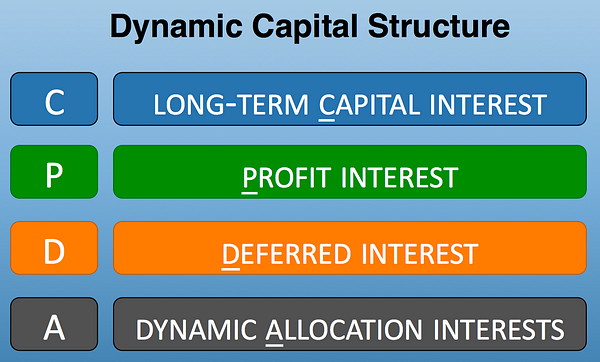
Depending on whether my financial needs are more short-term oriented (cash payout via “P-Units”) or long-term oriented (accumulating “A-Units” that increase my relative share of the overall pie) I am prompted to make a conscious decision and consider the trade-offs of my choices in relationship to my own needs, the needs of the organization (liquidity), as well as the needs of my partners. “D-Units” denote elected P-Units that cannot be paid out at the moment due to temporary cash flow shortage. The payment gets deferred to the next moment in time where that is possible, and is tracked in the form of D-Units.
Currently, our Finance role oversees all these factors with best effort to accommodate to all these needs in a balanced fashion. Although I personally don’t fill that Finance role myself at the moment, I feel invited to view my decisions through that lense too, because it could as well be me having to make that role’s decision and I feel a responsibility for the whole.
I feel as a co-entrepreneur — which I in fact am.
ORGANIZATION: Working in a holacratic system
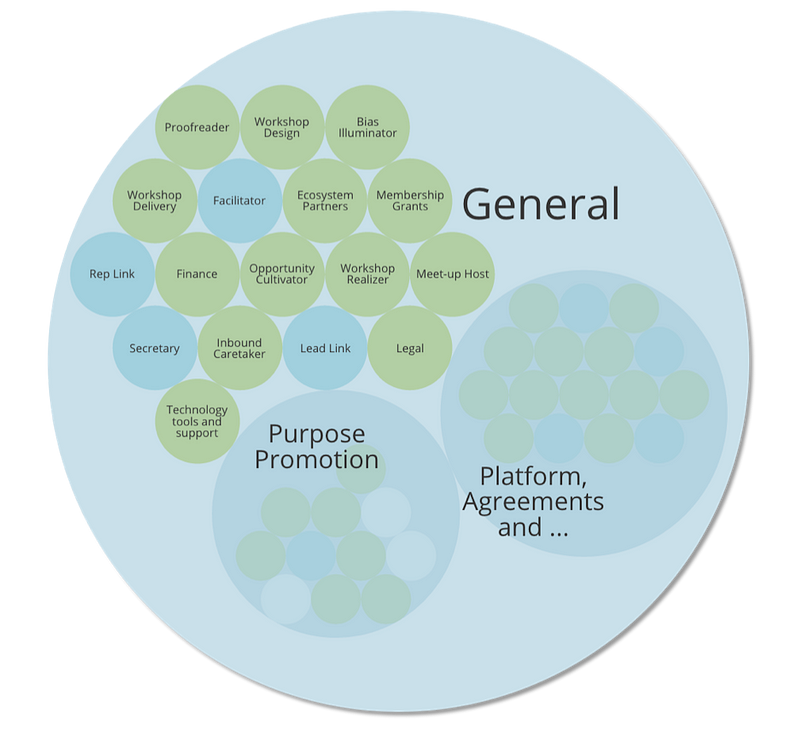
It is funny how what used to be a dream of mine — working in a holacratic environment — quickly became the new norm for me that I almost take for granted. I am surrounded by excellent Holacracy practitioners and learn a lot in this respect on a daily basis. I won’t try to give a complete list of all the advantages of Holacracy over more conventional approaches to organize the work, but instead will just focus on the aspects that I personally find most striking and enjoyable.
Nobody tells me what to do; nobody attempts to boss me around. I am being treated as an adult. I lead my roles and interpret them as I see fit. I prioritize the actions and projects of my roles dynamically.
I act as an adult. When I sense a gap between what is and what should be, I take responsibility for my tensions. I have multiple pathways that I can use to close that gap. I can bring it to a Tactical meeting and sync up with my colleagues. I can modify our work structure in a Governance meeting where I can create new roles, accountabilities, or policies to match the perceived needs, and grant or limit authorities to set new expectations. I can influence (“pitch”) my colleagues on a course of action. I can talk to the circle’s lead link or rep link. I can just improvise and take individual action outside of existing roles.
It’s a huge relief that I can rely on my colleagues to do the same to solve their own tensions. I don’t need to try to “help” them or heroically take over. They can perfectly take care of their own needs.
I feel invited to get creative and bring my talents to benefit the pursuit of the organization’s purpose. Leading and developing multiple roles speeds up my professional learning process. I get good at trying out new things and quickly acquire new skills. No traditional human resources department could ever pull off catalyzing this degree of learning and engagement.
ASSOCIATION: Showing up as a whole human being
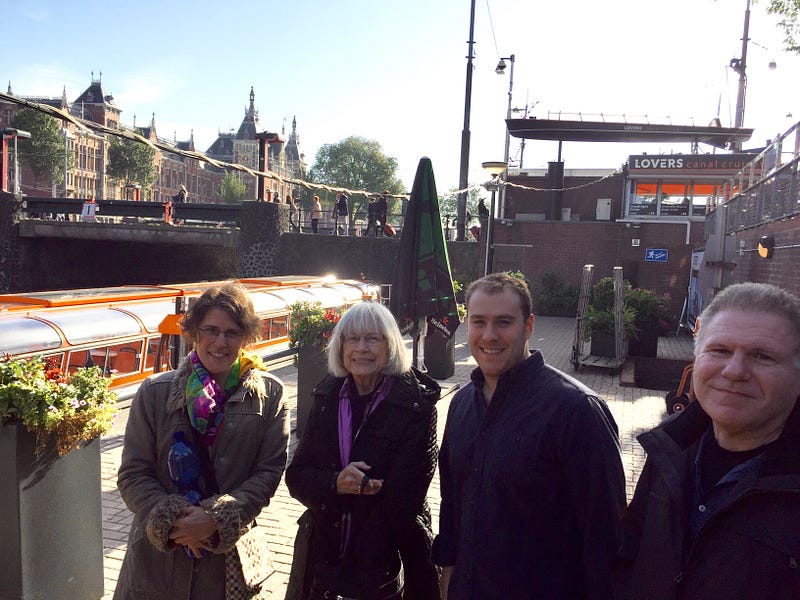
I work together with a bunch of amazing fellow human beings, a group of associates with a lot of diversity — different expertises, passions, type preferences, shades of humor, interaction styles, sexual orientation, cultural tastes, age, geographical location, etc., etc. The list is long.
The beauty is how this Association space embraces a true Unity-in-Diversity. Obviously it’s not just sweetness and light when humans come together to do what is valuable to them and what they truly care about in the world. It involves a lot of personal passion and sometimes we disagree on how we should pursue our common purpose. All the individual quirkiness, personal idiosyncrasies, and vulnerabilities play out. People feel unseen, unheard, misunderstood, have different needs and opinions.
At encode.org we hold the default assumption that things are cool, unless an Association member expresses a discomfort around a certain issue. We’re not big fans of emotional guesswork or of accumulating heaps of interpersonal drama karma. We expect the individual to have the maturity to take responsibility for processing stuff and to speak up if there is a problem.
If someone expresses a tension we help them to tease apart. If it is a work-related issue that can be processed via Holacracy. If not and it turns out to be personal or interpersonal in nature we attempt to set up the required conversations to help each other resolve our issues. Not everybody needs to be involved every time. No need to hold hands and sing “Kumbaya” all day long. Sometimes all it takes is for two or three people to get together in an atmosphere of respectful listening and talk it over.
Additionally, we are lucky to have a real individual-differences specialist on the team (Linda Berens) who can help Association members to identify their personality patterns (Interaction Styles and Essential Motivators), how they express intra- and inter-personally, and offer concrete counseling on how to accommodate to these needs and preferences. Heck, we are even plugged in to the “Matrix Insights” platform that allows us to map out our complete team along these dimensions and regularly offer tailor-made suggestion on how to best interact with that other colleague with ‘that weird personality type’ (as seen from my own personality preference).
In our Association space human relationships all feel really simple, effortless, and free. I don’t feel the implicit expectation that I need to love everybody. Whatever happens (or not happens) between two humans is just what is so. This very feature makes it really easy for me to embrace everybody with curiosity, openness, authenticity, and care. It comes naturally.
Paradoxically and surprisingly, this non-coercive free association exerts its own irresistible pull and I end up loving everybody in the end.
I can’t help it. If humans are invited to be fully human and show up in a safe shared space with all their emotions, quirks, and patterns, it’s almost impossible to not love them. Must be some form of natural law or something…
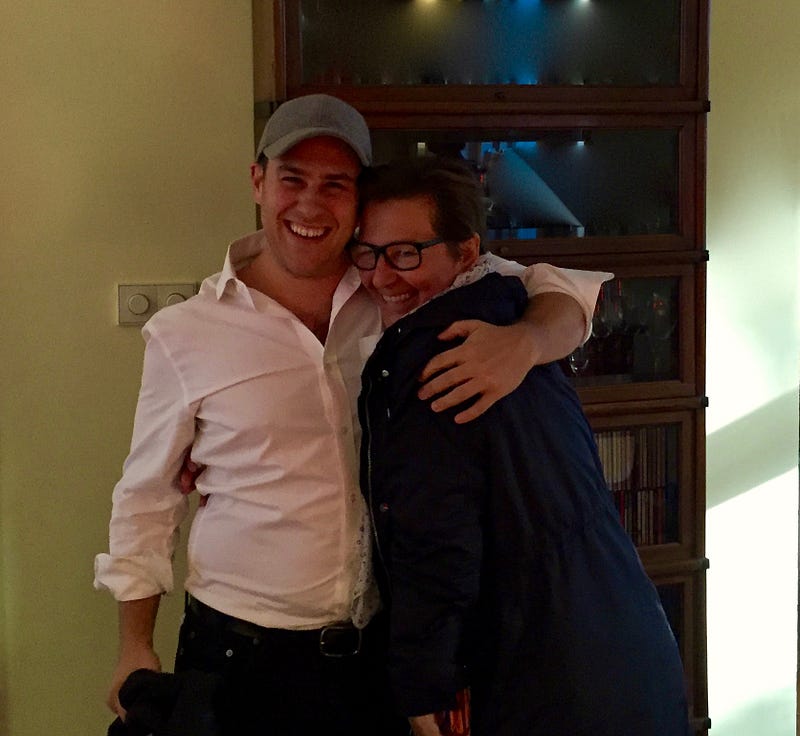
Living in the intersection of Company, Organization and Association
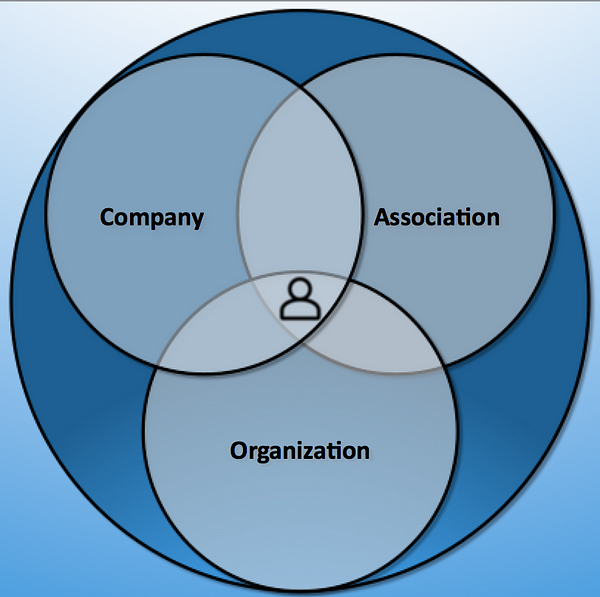
As a “Purpose Agent” I constantly navigate all three spaces. Sometimes the Organization is in the foreground, other times it is the Company, sometimes the Association — like a picture puzzle that flips back and forth between perspectives.
Holacracy is great for teasing apart the (inter)personal and the organizational aspects. Being a co-investor in the Company and not just a simple employee completely shifts the power dynamics. Since no single personal power holder can pull the plug on the legally-encoded Holacracy operating system, I don’t have to worry about the drama triangle re-entering the picture: without oppressor, there’s no victim and no need for a heroic rescuer.
Now, not even the employer-employee divide is left to distort the free association and exchange with others in the Association space. No need to please or appease anybody to get a pay raise, no covert power games, no lobbying, just unburdened relating from human to human.

I am even free to cross the organizational boundaries completely and engage in purposeful work beyond one single organization, serving multiple purposes for multiple organizations to varying degrees, cross-learning and cross-pollinating knowledge, skill, talent, and connections along the way; to mix and match, playing different work gigs simultaneously like a DJ — all with clear agreements. The platform we are building aims to provide the “turntables” for “Work-Jockeys“ to enable that (to stay in that metaphor).
Welcome to the future of working, earning and living on purpose. Let’s co-create an ecosystem of For-Purpose Enterprises and facilitate the free flow of Purpose Agents between them. If we can liberate the world of work from obsolete constructs and arbitrary divisions that disenfranchise us, and replace it with new models that tap into purpose, passion and creativity — just imagine what we could do collectively as humanity.
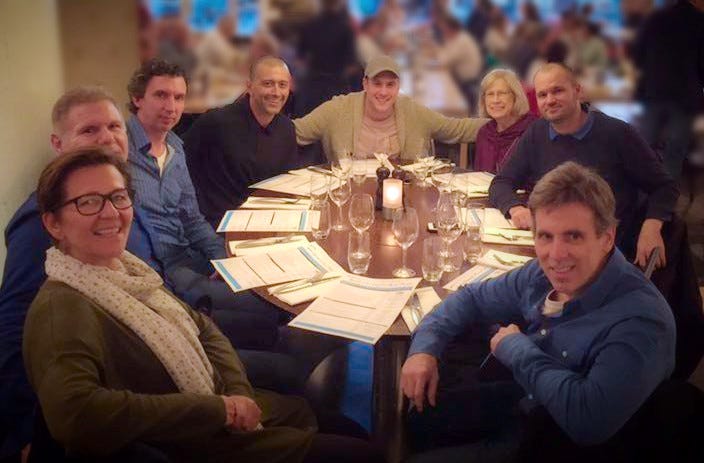
encode.org’s Association members during meetup in Amsterdam, Oct 2016
Permission to republish granted by the author.
Featured Image/Graphic link added by Enlivening Edge Magazine.




